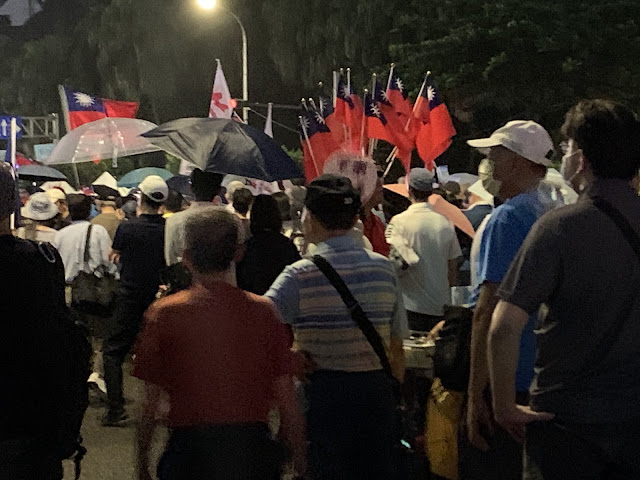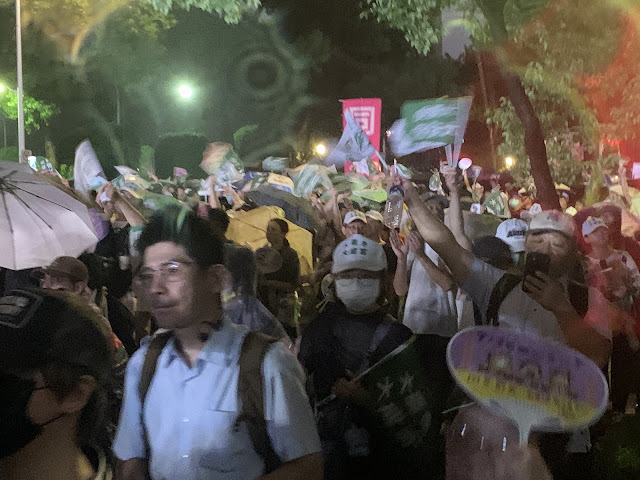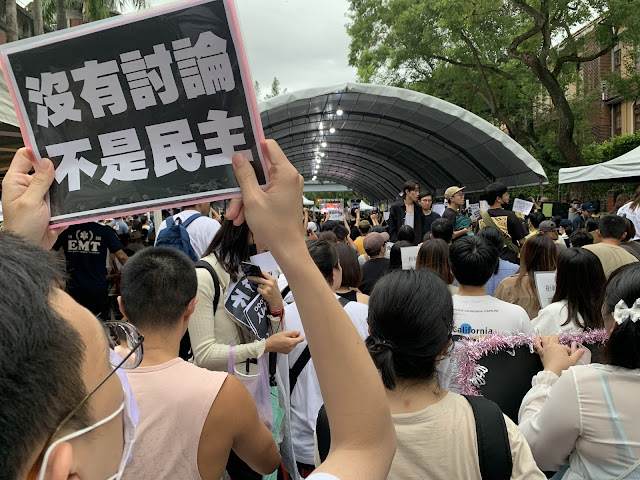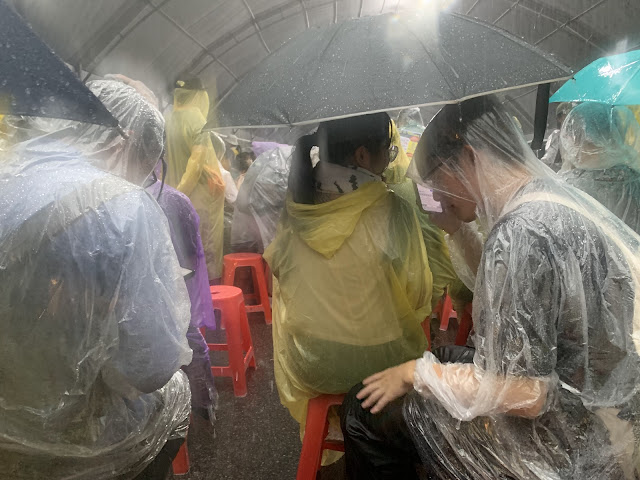It alternated between drizzling and pouring on Friday night, but I still went with my friend Donovan to check out the two rallies downtown -- the KMT-led anti-recall one on Ketagalan Boulevard, and the pan-green but not quite DPP-led pro-recall one near the Legislative Yuan.
As you can see, we felt some kind of way about the KMT rally:
The crowd was reasonable, though it didn't appear to attract as many people as the pro-recall rally on Thursday night at the same location. I wasn't able to attend that one due to work. I'm not sure this has any predictive value vis-a-vis the result, though. The pro-recall side is fired up, whereas anti-recall voters might turn out to support their legislature but not necessarily attend a rally. The rally was for the hardcore KMT base.
The top rally spot of Ketagalan Boulevard and Jingfu Gate is typically given to the opposition the night before any vote, and the ruling party gets it the night before that.
Rally positions technically require an application, and whichever party or group applies first gets the spot. In reality, however, I suppose it would look arrogant for the ruling party (or in this case the pan-green pro-recall movement) to take it, so the opposition always conveniently gets their application in 'first'.
This seems like a reasonable way to do things, and I would like to once again remind the KMT critics who claim the DPP is anti-democracy that true dictators don't give their opposition the best rally location the night before the election.
While turnout was indeed respectable, especially given the inclement weather, I noted that it was possible to walk around Jingfu Gate. I differentiate good rallies from massive ones by whether or not the gate is approachable.
During the Sunflowers, I couldn't even approach the gate; we sat somewhere back by the National Concert Hall. For the military conscript mistreatment rally (remember that one?) and the big marriage equality rallies, you could get to the circle but not approach the gate. During the DPP rally before the last election, if you made it to Ketagalan, you weren't able to leave until most of the rally had dispersed.
At this rally, one could walk right up to the gate. It was respectable, nothing more.
The first speaker that I saw was Ma Ying-jeou, who took the stage well before the more relevant names. The first (or any early) speaking spot at a rally is widely known to be undesireable; to put him on so early bordered on insult. I'm fine with that, but I wonder how Ma feels about it.
Other speakers included Taipei mayor Chiang Wan-an doing his best impression of a real human being. In fact, he wasn't bad -- he showed just a tough of that Han Kuo-yu swagger. Han Kuo-yu got some big cheers; I do see why his charisma appeals to some people. He was a bit more toned down last night, but got the biggest crowd response.
The rally wasn't the usual KMT oldsters; there were people of all ages, with all kinds of air horns.
We left during Wang Hung-wei's speech; Hsu Chiao-hsin and (I believe Lo Chi-chiang were due to take the stage later. I don't think they put Fu Kun-chi on; he's facing castigation even from within his own party and feels by far to be the most hated of the legislators up for recall.
He might be toast. Frankly, I hope he is. Dude's a convicted criminal. But Hualien isn't going to swing green, so the best we can hope for is a quieter KMTer taking his place. Unless, of course, there's a split in the party that helps it skip from the KMT's fingers.
Nobody at the KMT rally said anything particularly inspiring or even interesting; there were some TPP flags and other paraphernalia, making the TPP feel even more like a little blue lapdog.
There was quite a lot of talk about "protecting democracy", and there's an argument to be made that the recall mechanism was never meant to be used this way.
It is a weird argument for the KMT specifically to make, however, they have tried to use the same recall mechanisms against the DPP more than once. If they really believed this mass recall push was undemocratic, they wouldn't have tried the exact same thing multiple times. Unless, of course, democracy only matters when criticizing your opponent.
Most of the chants were along the lines of "who are the bad people?" "The DPP!" I'm not making this up -- I can't recall the exact language but it was something along the lines of 「最壞的人都是誰?」 / 「民進黨!」-- and all I can say in terms of analysis is that that's pretty dumb.
But here we are, and both parties have now tried to use it as a way to tear each other down. Now that the KMT has realized that its own efforts to use recalls to force out DPPers has very limited success -- hardly any at all, in fact -- but green civic groups (not even the party machine) can use it to astounding effect against the KMT, the law is probably going to be changed once again.
That is, if the balance in the legislature isn't tipped in a few hours. Let's see. I doubt the DPP is going to gain a long-term majority by winning enough by-elections, but there's a chance, and a pretty fair chance at them having a temporary majority if enough legislators are tossed out.
However, shouting about how recall votes are undemocratic while a few people hold up images of (democratically-elected) President Lai with a Hitler mustache is...perhaps not sending the message they think it is.
To be honest, it just didn't feel like anything. This is obviously colored by my subjective opinion; I don't care for the KMT. But it was so party-driven, so hollow. There wasn't any sense of grassroots activism. The messaging wasn't much deeper than "we're the KMT and you're our base, so vote for us". I didn't hear many substantive arguments for their not being in China's pocket, and although they intentionally chose a Taiwanese-speaking emcee who broke out the Hoklo whenever possible, they barely even called Taiwan 'Taiwan'.
I'm trying to recall if they even called this country a country -- perhaps. The two beers, rain and lady with an airhorn made it hard to follow everything that was said. But it felt more like party loyalty than love for a country. Bo-ring.
Will I attend another KMT rally someday, just to see what it's like? Probably not. I live in a deep blue district. I already know what their supporters are like. We're not similar in values or general worldview.
I believe in self-determination, and Taiwanese people obviously do not want to be part of the PRC. No KMT shenanigans can change that. I believe Taiwan is a country with a distinct history and culture; the KMT does not. I believe China's actions make it not only untrustworthy, but an enemy of Taiwan. The KMT refuses to see this (though I believe they know it to be true).
They call the DPP a "dictatorship" when they are the former dictators. They say the DPP is undemocratic even though the DPP has always been democratically elected -- they haven't always been. They call Lai "Hitler" when the KMT was the committer of mass murder; the DPP has never done this.
I simply see no common ground with the KMT after living here for 19 years. The longer I stay and the more history I read, the stronger that opinion gets.
A short walk away was the pan-green rally, which had no DPP heavyweights -- an intentional (and smart) choice. This is when it really started pouring, so photography wasn't as easy and I could neither see the stage nor hear the speakers clearly. I wanted to be there to support this side, so I stood grimly under an umbrella as my feet, legs and butt got soaked, but I heard nothing.
Better music, though. They had some indie rappers, whereas the KMT had...the usual rally background music. They had Robert Tsao (of UMC) but no other big names.
I know some people still accuse the pro-recall people of being DPP-backed, and the DPP certainly has encouraged and supported them. If this were a party operation, however, this would have felt more like a DPP rally. It simply didn't. It felt like the marriage equality rally, the Sunflowers. In fact, more than once we heard 島嶼天光 (Island Sunrise), the old Sunflower anthem penned by Kaohsiung-based Fire EX (滅火器).
People sang it as we left the rally. They cheered at passing cars (the KMTers did not). Nobody had an air horn, thank goodness. People came up and talked to us (the KMT rally attendees did not, though to be fair, I was wearing a pro-recall hat but nothing indicating my views at the KMT rally). They chanted to take down Fu Kun-chi; there were also anti- Huang Kuo-chang chants even though he's not up for recall.
Just as the recall activists in Lo Chi-chiang's district are hell-bent on taking him down, the entire pro-recall movement has turned Fu into a villain.
Well, that's not entirely fair. He turned himself into a villain. The recall activists are just pointing it out.
The rain got harder, but the people didn't leave. It wasn't as big as the KMT rally, but again, the big Ketagalan pro-recall event was Thursday night, not Friday.
At the tail end, as the crowd left in the direction of Zhongxiao Road, a group of us started singing Island Sunrise again, and you could really feel the emotion when they got to the last line -- the brave Taiwanese (勇敢ㄟ台灣郎) while waiting for the crosswalk signal.
I haven't felt a lot these weeks. There's a lot, from my sick cat to my stagnant career to...a lot. I've felt a bit directionless, meaningless, my life lacking in impact. I've felt like a wraith. I've asked myself whether I made the right choice to build a life in Taiwan, because I don't know where it's heading anymore.
I was soaked like a Jane Austen heroine who gets caught in the rain, catches typhus and needs to stay at her love interest's mansion to be bled with leeches, but in that moment I felt like a real person who cared about something. I don't know how long it will last, but at least I felt like I was with people like me and there was, however briefly, meaning in being in Taiwan.

















































